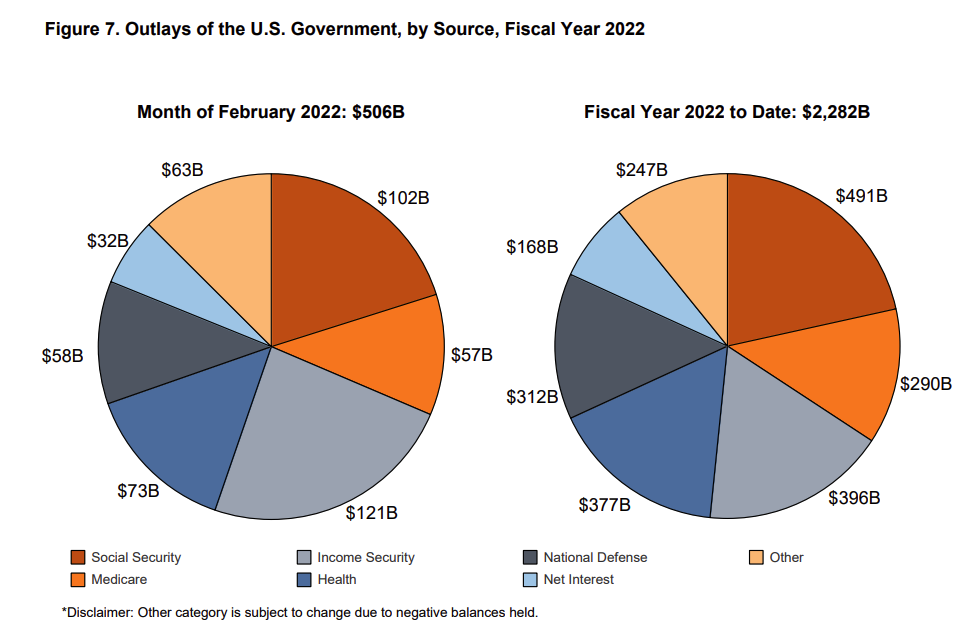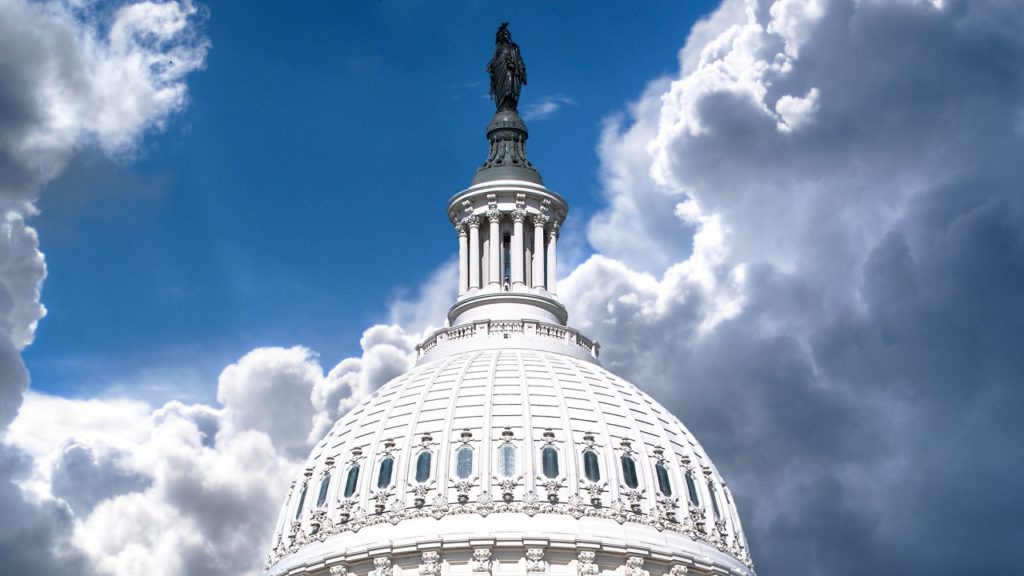Biggest Federal Budget Deficit Since July; This Is Bad News for the Fed
If you thought the federal government running a budget surplus in January was a sign that Washington D.C. was getting its fiscal house in order, you’re going to be disappointed.
Uncle Sam ran the biggest deficit since last July in February.
The budget shortfall for the month came in at $216.6 billion, according to the latest Treasury statement. When you run the numbers, you discover that the federal government only paid for 48.2% of its spending last month.
A drop in tax intake didn’t help. Federal receipts fell to $289.9 billion after two straight months over $400 billion.
Meanwhile, the US government continues to spend money at a torrid pace. Uncle Sam spend over half-a-trillion dollars in February alone. ($506.5 billion.)
So far in fiscal 2022, the federal government has blown through $2.28 trillion and we’re not even halfway through.

The national debt currently stands at $30.17 trillion.
According to the National Debt Clock, the debt to GDP ratio is 125.61%. Despite the lack of concern in the mainstream, debt has consequences. More government debt means less economic growth. Studies have shown that a debt to GDP ratio of over 90% retards economic growth by about 30%. This throws cold water on the conventional “spend now, worry about the debt later” mantra, along with the frequent claim that “we can grow ourselves out of the debt” now popular on both sides of the aisle in DC.
To put the debt into perspective, every American citizen would have to write a check for $91,100 in order to pay off the national debt.
This is a big problem for the Federal Reserve.
The central bank is talking about ending quantitative easing and shrinking its balance sheet. If it does, who is going to buy all of the Treasuries necessary to finance this debt? Despite Jerome Powell’s insistence that the Fed isn’t monetizing the debt because it doesn’t intend to hold onto the bonds forever, Peter Schiff said that’s exactly what the central bank is doing. As he put it, the road to hell is paved with good intentions.
Who cares about what you intend to do? What matters is what you actually do. And clearly, the road to debt monetization is paved with good intentions because that’s what the Fed is doing. It doesn’t matter if they intend to shrink the balance sheet. What matters is it’s not shrinking. It continues to grow. And even if they start shrinking it like they did when it was four-and-a-half trillion and they shrunk it down to about three-and-a-half trillion, what difference does that make if now we’re at nine trillion? If you only shrink it a little bit and then you expand it even more, you are monetizing the debt.”
And despite all the finger-pointing as politicians in Washington D.C. try to pin the blame for inflation on anyone other than themselves, this borrowing and spending is a big factor in America’s soaring inflation. Buying Treasury bonds through quantitative easing means the Fed is effectively printing money out of thin air and dumping it into the economy. This is one reason Peter is so confident that inflation will keep going up. It seems implausible that the Fed can stop subsidizing the government’s borrowing without collapsing the whole Ponzi scheme. The government needs the Fed’s big fat thumb on the bond market to finance its deficits.





 Since Nayib Bukele became president of El Salvador, El Salvador has been in American media and global political discussion more than ever. While much of the attention focuses on Bukele’s mass incarceration of gang members and a decline in homicide of over 70%, Bukele has also drawn attention to his favoritism towards Bitcoin and how he […]
Since Nayib Bukele became president of El Salvador, El Salvador has been in American media and global political discussion more than ever. While much of the attention focuses on Bukele’s mass incarceration of gang members and a decline in homicide of over 70%, Bukele has also drawn attention to his favoritism towards Bitcoin and how he […] With gold hitting yet another awe-inspiring all-time high in the wake of Powell’s remarks reassuring markets (more or less) to expect rate cuts in 2024, a few analysts are pointing out risk factors for a correction — so is there really still room to run?
With gold hitting yet another awe-inspiring all-time high in the wake of Powell’s remarks reassuring markets (more or less) to expect rate cuts in 2024, a few analysts are pointing out risk factors for a correction — so is there really still room to run? Gold hit a new all-time nominal high, surpassing the previous record set in December of the previous year. The precious metal’s price reached approximately $2,140, indicating a robust and continuing interest in gold as a safe-haven asset, despite a rather peculiar lack of fanfare from the media and retail investors. This latest peak in gold […]
Gold hit a new all-time nominal high, surpassing the previous record set in December of the previous year. The precious metal’s price reached approximately $2,140, indicating a robust and continuing interest in gold as a safe-haven asset, despite a rather peculiar lack of fanfare from the media and retail investors. This latest peak in gold […] The gold price has been surging, with unprecedented central bank demand gobbling up supply. It has been a force to behold — especially as US monetary policy has been relatively tight since 2022, and 10-year Treasury yields have rocketed up, which generally puts firm downward pressure on gold against USD.
The gold price has been surging, with unprecedented central bank demand gobbling up supply. It has been a force to behold — especially as US monetary policy has been relatively tight since 2022, and 10-year Treasury yields have rocketed up, which generally puts firm downward pressure on gold against USD.  Total gold demand hit an all-time high in 2023, according to a recent report released by the World Gold Council. Last week, the World Gold Council (WGC) released its Gold Demand Trends report, which tracks developments in the demand for and use of gold around the world. Excluding over-the-counter (OTC) trade, 2023 gold demand fell slightly from 2022 […]
Total gold demand hit an all-time high in 2023, according to a recent report released by the World Gold Council. Last week, the World Gold Council (WGC) released its Gold Demand Trends report, which tracks developments in the demand for and use of gold around the world. Excluding over-the-counter (OTC) trade, 2023 gold demand fell slightly from 2022 […]